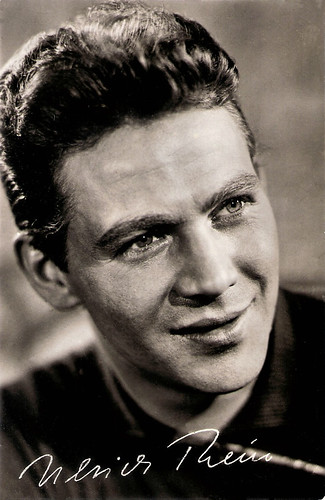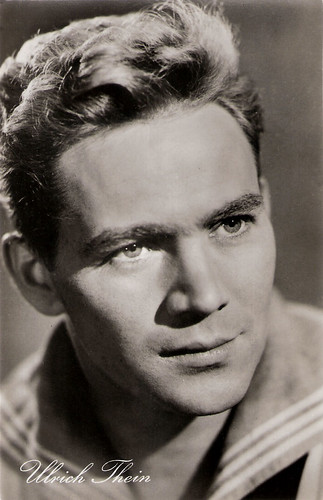German actor, film director and screenwriter Ulrich Thein (1940–1995) appeared in 44 films and television shows between 1952 and 1995. His film Romanze mit Amélie/Romance with Amelie (1982) was entered into the 32nd Berlin International Film Festival.

East-German postcard by VEB Progress Film-Vertrieb, no. 2265, 1965. Retail price: 0,15 MDN. Photo: Schwarzer.

East-German postcard by VEB Progress Film-Vertrieb, no. 1613, 1961. Retail price: 0,20 DM. Photo: A. Paskowiak.
Ulrich Thein was born in Braunschweig (Brunswick), Germany in 1940. He was the son of a theatre conductor and grew up under difficult conditions. His father died when Ulrich was four years old, and his mother, Else Thein, had to manage the family (Thein had two older brothers).
After high school, Thein studied music (harp and piano), and took acting classes. He got an engagement at the Staatstheater Braunschweig. In 1951 he moved over to East Germany and got his first role as the youngest member of the Deutsches Theater in Berlin, where he remained until 1963.
He also played at the Theater der Freundschaft in Berlin (now Theater an der Parkaue) and was then actor and director at the Theater der Bergarbeiter(Theater of the miners) in Senftenberg.
Ulrich started his film career with the DEFA thriller Geheimakten Solvay/Secret Files of Solvay (Martin Hellberg, 1952) with Leny Marenbach.
In 1954 he played a supporting part in the crime film Alarm im Zirkus/Alarm in the Circus (Gerhard Klein, 1954) starring Erwin Geschonneck. This film was based on true events. In 1953 a robbery of horses at Circus Barlay had been foiled and the screenplay was based on the press reports. With 3.6 million filmgoers, Alarm im Zirkus became the blockbuster of the year in East-Germany.
From then on Ulrich Thein played numerous roles in films by Martin Hellberg, Frank Beyer and Konrad Wolf. Among his other early DEFA films were Thomas Müntzer – Ein Film deutscher Geschichte/Thomas Müntzer (Martin Hellberg, 1956), Das Lied der Matrosen/The Sailor's Song (Kurt Maetzig, Günter Reisch, 1958) and SAS 181 antwortet nicht/SAS 181 Does Not Answer (Carl Ballhaus, 1959).
For the crime film Spur in die Nacht/Track in the night (Günter Reisch, 1957) he also was involved in the soundtrack for which he composed the Fuchsbau-Boogie (Burrow Boogie).

East-German postcard by VEB Progress Film-Vertrieb, no. 3941/431, 1957. Retail price: 0,20 DM. Photo: DEFA / Wunsch.

East-German postcard by VEB Progress Film-Vertrieb, no. 1675, 1962. Retail price: 0,20 DM. Photo: A. Paskowiak.
In the early 1960s, Ulrich Thein continued to star in several East-German films, including the war drama Fünf Patronenhülsen/Five Cartridges (Frank Beyer, 1960) co-starring Armin Mueller-Stahl, the drama Professor Mamlock (Konrad Wolf, 1961) featuring Wolfgang Heinz, Septemberliebe/September Love (Kurt Maetzig, 1961), Königskinder/Star-Crossed Lovers (Frank Beyer, 1962) with Annekathrin Bürger, and Chronik eines Mordes/The Story of a Murder (Lothar Bellag, 1965) opposite Angelica Domröse.
In 1963 he wrote for the first time the script for a TV film, Der andere neben dir/The other one next to you, which he also directed successfully. For one and a half decades, Thein was one of the most successful television directors of the GDR. He took on important current themes again and again. He directed carefully and with much feeling for detail.
Since the late 1970s he made a come-back as a television actor in the series Polizeiruf 110/Police 110 (1977-1990). He also convincingly played the title roles in the biopics Martin Luther (Kurt Veth, 1982) and Johann Sebastian Bach (Lothar Bellag, 1983).
In 1982, he directed the film Romanze mit Amélie/Romance with Amelie (Ulrich Thein, 1982), which was entered into the 32nd Berlin International Film Festival. Thein became member of the Akademie der Künste der DDR (Academy of Arts of the GDR) in 1985, which he left in 1991 in protest against the terms of the unification of East and West-German Academies.
After the liquidation of the East-German television broadcaster DFF, he declined many ‘trivial’ offers by producers. From 1992 on, he worked as a lecturer at the Drama School Ernst Busch in Berlin. In addition to his work as an actor and director, Thein was also a pianist and he composed songs for his films.
His last film appearance was in the TV film Blutige Spur/Bloody Trail (Carlo Rola, 1995) starring Jan Niklas.
Ulrich Thein died in 1995 in Berlin. He was 54. His partners in life and in the cinema have included the actresses Christel Thein-Sörgel, Annekathrin Bürger und Renate Geißler. He was married to actress Jana Brejchová and after their divorce to actress Franziska Troegner till his death.

East-German postcard by VEB Progress Film-Vertrieb, no. 880, 1958. Retail price: 0,20 DM. Photo: DEFA. Publicity still for Das Lied der Matrosen/The Sailor's Song (Kurt Maetzig, Günter Reisch, 1958).

East-German postcard by VEB Progress Film-Vertrieb, no. 3943/657, 1958. Retail price: 0,20 DM. Photo: DEFA / Wunsch.
Sources: Wikipedia (German and English) and IMDb.
East-German postcard by VEB Progress Film-Vertrieb, no. 2265, 1965. Retail price: 0,15 MDN. Photo: Schwarzer.
East-German postcard by VEB Progress Film-Vertrieb, no. 1613, 1961. Retail price: 0,20 DM. Photo: A. Paskowiak.
DEFA Thriller
Ulrich Thein was born in Braunschweig (Brunswick), Germany in 1940. He was the son of a theatre conductor and grew up under difficult conditions. His father died when Ulrich was four years old, and his mother, Else Thein, had to manage the family (Thein had two older brothers).
After high school, Thein studied music (harp and piano), and took acting classes. He got an engagement at the Staatstheater Braunschweig. In 1951 he moved over to East Germany and got his first role as the youngest member of the Deutsches Theater in Berlin, where he remained until 1963.
He also played at the Theater der Freundschaft in Berlin (now Theater an der Parkaue) and was then actor and director at the Theater der Bergarbeiter(Theater of the miners) in Senftenberg.
Ulrich started his film career with the DEFA thriller Geheimakten Solvay/Secret Files of Solvay (Martin Hellberg, 1952) with Leny Marenbach.
In 1954 he played a supporting part in the crime film Alarm im Zirkus/Alarm in the Circus (Gerhard Klein, 1954) starring Erwin Geschonneck. This film was based on true events. In 1953 a robbery of horses at Circus Barlay had been foiled and the screenplay was based on the press reports. With 3.6 million filmgoers, Alarm im Zirkus became the blockbuster of the year in East-Germany.
From then on Ulrich Thein played numerous roles in films by Martin Hellberg, Frank Beyer and Konrad Wolf. Among his other early DEFA films were Thomas Müntzer – Ein Film deutscher Geschichte/Thomas Müntzer (Martin Hellberg, 1956), Das Lied der Matrosen/The Sailor's Song (Kurt Maetzig, Günter Reisch, 1958) and SAS 181 antwortet nicht/SAS 181 Does Not Answer (Carl Ballhaus, 1959).
For the crime film Spur in die Nacht/Track in the night (Günter Reisch, 1957) he also was involved in the soundtrack for which he composed the Fuchsbau-Boogie (Burrow Boogie).

East-German postcard by VEB Progress Film-Vertrieb, no. 3941/431, 1957. Retail price: 0,20 DM. Photo: DEFA / Wunsch.

East-German postcard by VEB Progress Film-Vertrieb, no. 1675, 1962. Retail price: 0,20 DM. Photo: A. Paskowiak.
Johann Sebastian Bach
In the early 1960s, Ulrich Thein continued to star in several East-German films, including the war drama Fünf Patronenhülsen/Five Cartridges (Frank Beyer, 1960) co-starring Armin Mueller-Stahl, the drama Professor Mamlock (Konrad Wolf, 1961) featuring Wolfgang Heinz, Septemberliebe/September Love (Kurt Maetzig, 1961), Königskinder/Star-Crossed Lovers (Frank Beyer, 1962) with Annekathrin Bürger, and Chronik eines Mordes/The Story of a Murder (Lothar Bellag, 1965) opposite Angelica Domröse.
In 1963 he wrote for the first time the script for a TV film, Der andere neben dir/The other one next to you, which he also directed successfully. For one and a half decades, Thein was one of the most successful television directors of the GDR. He took on important current themes again and again. He directed carefully and with much feeling for detail.
Since the late 1970s he made a come-back as a television actor in the series Polizeiruf 110/Police 110 (1977-1990). He also convincingly played the title roles in the biopics Martin Luther (Kurt Veth, 1982) and Johann Sebastian Bach (Lothar Bellag, 1983).
In 1982, he directed the film Romanze mit Amélie/Romance with Amelie (Ulrich Thein, 1982), which was entered into the 32nd Berlin International Film Festival. Thein became member of the Akademie der Künste der DDR (Academy of Arts of the GDR) in 1985, which he left in 1991 in protest against the terms of the unification of East and West-German Academies.
After the liquidation of the East-German television broadcaster DFF, he declined many ‘trivial’ offers by producers. From 1992 on, he worked as a lecturer at the Drama School Ernst Busch in Berlin. In addition to his work as an actor and director, Thein was also a pianist and he composed songs for his films.
His last film appearance was in the TV film Blutige Spur/Bloody Trail (Carlo Rola, 1995) starring Jan Niklas.
Ulrich Thein died in 1995 in Berlin. He was 54. His partners in life and in the cinema have included the actresses Christel Thein-Sörgel, Annekathrin Bürger und Renate Geißler. He was married to actress Jana Brejchová and after their divorce to actress Franziska Troegner till his death.

East-German postcard by VEB Progress Film-Vertrieb, no. 880, 1958. Retail price: 0,20 DM. Photo: DEFA. Publicity still for Das Lied der Matrosen/The Sailor's Song (Kurt Maetzig, Günter Reisch, 1958).

East-German postcard by VEB Progress Film-Vertrieb, no. 3943/657, 1958. Retail price: 0,20 DM. Photo: DEFA / Wunsch.
Sources: Wikipedia (German and English) and IMDb.
No comments:
Post a Comment